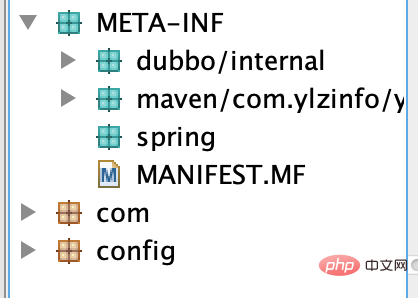How to use maven to package the dubbo project into a jar package to run
The method discussed in this article to use maven to package the dubbo project into a jar package for running is: use the maven packaging plug-in maven-jar-plugin to add some code at the end of the pom.xml file. Interested friends can take a look, I hope it can help you
maven packaging method
Use maven packaging plug-inmaven-jar-plugin
at Add the following code at the end of the pom.xml file. maven-dependency-plugin refers to copying the dependent jar package to the specified directorymaven-resources-pluginCopying the dependent resources to the specified directory
<build>
<plugins>
<plugin>
<groupId>org.apache.maven.plugins</groupId>
<artifactId>maven-jar-plugin</artifactId>
<version>2.6</version>
<configuration>
<archive>
<manifest>
<!-- 是否依赖外部jar包 -->
<addClasspath>true</addClasspath>
<!-- 依赖外部jar包路径 -->
<classpathPrefix>lib/</classpathPrefix>
<!-- 启动函数 --> <mainClass>com.alibaba.dubbo.container.Main</mainClass>
</manifest>
</archive>
<!-- 打包之后输出目录 -->
<outputDirectory>${project.build.directory}/maven-archiver</outputDirectory>
<!-- 剔除已打包的配置文件 -->
<excludes>
<exclude>*.*</exclude>
<exclude>config/*</exclude>
<exclude>config/tencent/*</exclude>
<exclude>META-INF/spring/*</exclude>
</excludes>
</configuration>
</plugin>
<!-- 拷贝依赖的jar包到lib目录 -->
<plugin>
<groupId>org.apache.maven.plugins</groupId>
<artifactId>maven-dependency-plugin</artifactId>
<version>2.8</version>
<executions>
<execution>
<id>copy-dependencies</id>
<phase>package</phase>
<goals>
<goal>copy-dependencies</goal>
</goals>
<configuration>
<outputDirectory>
${project.build.directory}/maven-archiver/lib
</outputDirectory>
</configuration>
</execution>
</executions>
</plugin>
<!-- 拷贝依赖的资源文件包到resources目录 -->
<plugin>
<artifactId>maven-resources-plugin</artifactId>
<executions>
<execution>
<id>copy-resources</id>
<phase>package</phase>
<goals>
<goal>copy-resources</goal>
</goals>
<configuration>
<outputDirectory>${project.build.directory}/maven-archiver/resources</outputDirectory>
<resources>
<resource>
<directory>${basedir}/src/main/resources</directory>
<filtering>true</filtering>
</resource>
</resources>
</configuration>
</execution>
</executions>
</plugin>
</plugins>
</build>- How to run the jar package
The directory structure after packaging
Contains the class file and the required configuration file information (excluding excludes configuration files)

Contains the information required for operation in MANIFEST.MF
Class-Path: lib/commons-beanutils-1.8.3.jar lib/commons-betwixt-0.8.jar ... Main-Class: com.alibaba.dubbo.container.Main
java -jar
Start command
java -jar When executing the command, the Main-Class parameter in the directory META-INFMANIFEST.MF will be used. This is the entry point of the function specified during packaging.
java -jar x-0.0.1-SNAPSHOT.jar
java -cp
Startup command
java -cp .:x-0.0.1-SNAPSHOT.jar packname.mainclassname
Because I need to reference external resources files in my project, I usually start in this way
The configuration file address is an absolute path
java -cp /Users/username/resources:dubbo-service-1.0.jar com.alibaba.dubbo.container.Main
-cp and -classpath have the same effect
java -cp is the dependency of the specified operation The path of other classes, usually class libraries, jar packages, etc. Multiple dependencies are separated by semicolons ";" on Window and ":" on linux .
Expressions support wildcards
java -cp .:/Users/username/*.jar packname.mainclassname
- Type into a jar package
If you need to run all dependent jar packages into one jar package, you can use maven-shade-pluginThis plugin.
The main function of this plug-in is to package the dependent jar package into the current jar package, and rename the class during packaging, which can solve the multi-version conflict of the jar package. For details, you can check the official plug-in documentation.
Related tutorials: Java video tutorial
The above is the detailed content of How to use maven to package the dubbo project into a jar package to run. For more information, please follow other related articles on the PHP Chinese website!

Hot AI Tools

Undresser.AI Undress
AI-powered app for creating realistic nude photos

AI Clothes Remover
Online AI tool for removing clothes from photos.

Undress AI Tool
Undress images for free

Clothoff.io
AI clothes remover

AI Hentai Generator
Generate AI Hentai for free.

Hot Article

Hot Tools

Notepad++7.3.1
Easy-to-use and free code editor

SublimeText3 Chinese version
Chinese version, very easy to use

Zend Studio 13.0.1
Powerful PHP integrated development environment

Dreamweaver CS6
Visual web development tools

SublimeText3 Mac version
God-level code editing software (SublimeText3)

Hot Topics
 Square Root in Java
Aug 30, 2024 pm 04:26 PM
Square Root in Java
Aug 30, 2024 pm 04:26 PM
Guide to Square Root in Java. Here we discuss how Square Root works in Java with example and its code implementation respectively.
 Perfect Number in Java
Aug 30, 2024 pm 04:28 PM
Perfect Number in Java
Aug 30, 2024 pm 04:28 PM
Guide to Perfect Number in Java. Here we discuss the Definition, How to check Perfect number in Java?, examples with code implementation.
 Random Number Generator in Java
Aug 30, 2024 pm 04:27 PM
Random Number Generator in Java
Aug 30, 2024 pm 04:27 PM
Guide to Random Number Generator in Java. Here we discuss Functions in Java with examples and two different Generators with ther examples.
 Armstrong Number in Java
Aug 30, 2024 pm 04:26 PM
Armstrong Number in Java
Aug 30, 2024 pm 04:26 PM
Guide to the Armstrong Number in Java. Here we discuss an introduction to Armstrong's number in java along with some of the code.
 Weka in Java
Aug 30, 2024 pm 04:28 PM
Weka in Java
Aug 30, 2024 pm 04:28 PM
Guide to Weka in Java. Here we discuss the Introduction, how to use weka java, the type of platform, and advantages with examples.
 Smith Number in Java
Aug 30, 2024 pm 04:28 PM
Smith Number in Java
Aug 30, 2024 pm 04:28 PM
Guide to Smith Number in Java. Here we discuss the Definition, How to check smith number in Java? example with code implementation.
 Java Spring Interview Questions
Aug 30, 2024 pm 04:29 PM
Java Spring Interview Questions
Aug 30, 2024 pm 04:29 PM
In this article, we have kept the most asked Java Spring Interview Questions with their detailed answers. So that you can crack the interview.
 Break or return from Java 8 stream forEach?
Feb 07, 2025 pm 12:09 PM
Break or return from Java 8 stream forEach?
Feb 07, 2025 pm 12:09 PM
Java 8 introduces the Stream API, providing a powerful and expressive way to process data collections. However, a common question when using Stream is: How to break or return from a forEach operation? Traditional loops allow for early interruption or return, but Stream's forEach method does not directly support this method. This article will explain the reasons and explore alternative methods for implementing premature termination in Stream processing systems. Further reading: Java Stream API improvements Understand Stream forEach The forEach method is a terminal operation that performs one operation on each element in the Stream. Its design intention is






